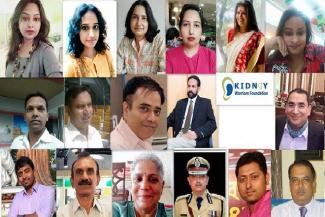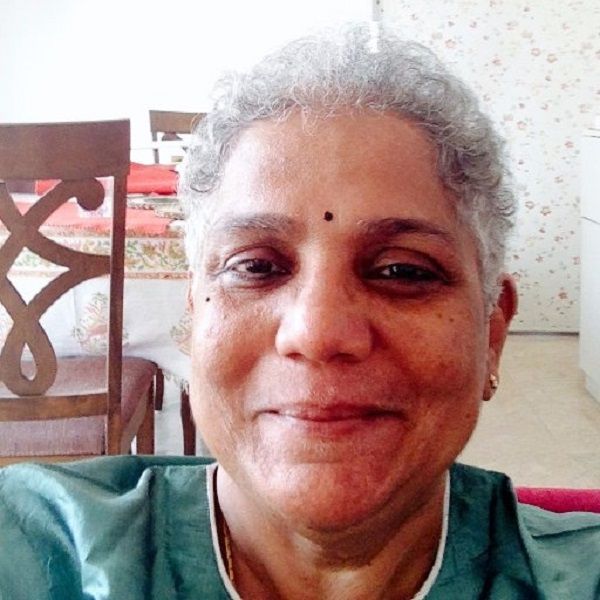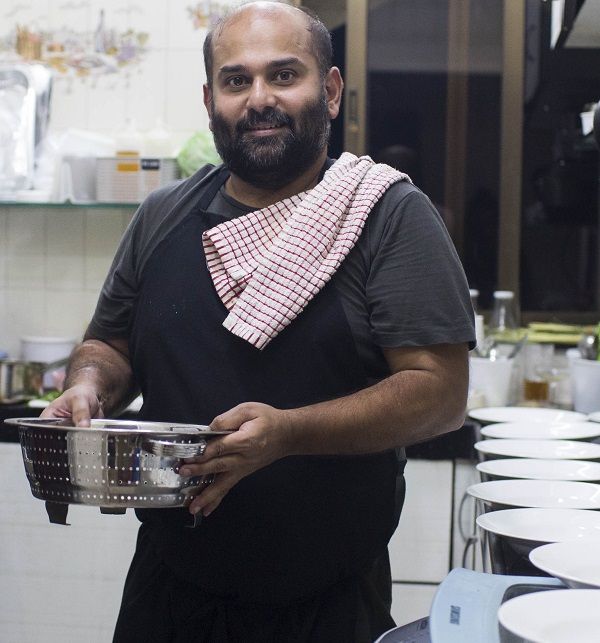
Vasundhara Raghavan is the author of two books on chronic kidney diseases, one of which narrates the life of her son, Aditya, who has lived through dialysis and two transplants. In a detailed interview she talks about the harrowing twists and turns the family battled.
You have had a very close brush with chronic kidney disease (CKD) and its devastating complications. Could you tell us how and when it started?
My life changing experience began in November 1996. A headache kept my son, Aditya, at home when his ICSE Boards were in March. As a working mother I wanted him in school, as fear of his bad performance in studies was bothering me! Aditya was content watching Cricket World Cup on television, raising my irritation a notch higher. Two days later, taking control of the situation I took him to an optholmologist. With his sight facing no issue, we were sent home to speculate about real cause for worry. We then knocked at the door of our general practioner who, for some reason, tested his blood pressure. It was too high for a 15 year old, so we were rushed to a pathologist for a blood test which revealed a high creatinine at 4.58mg/dl. (Normal levels of creatinine in the blood are approximately 0.6 to 1.2 milligrams (mg) per deciliter (dL)
Our visit to a senior nephrologist gave us an indication that Aditya’s kidneys were damaged. The doctor had told us casually, “If we had performed a surgical intervention 5 years ago there was a chance to save his kidneys.” At 10 years, concerned with bed-wetting habits, we had reached out to a senior urologist who advised us to wait for 4-5 years. This wait period would have been the window for corrective surgery - we had lost a chance of saving Aditya’s kidneys. Our world shattered, blowing away all semblance of hope for a decent life for the family.
Somehow, as educated parents, it hurt us that we had not considered a second opinion. That opinion could have saved us some grace.
A kidney disease requires several radical lifestyle changes that affect social and psychological functioning. How did your son, Aditya, and your family deal with it?
Today, 23 years later, I can say our lives changed 360 degrees. All desires stowed away, only to see it pop out to make us wonder, where has life gone, where are those promised gardens! That space has a fortress with drab walls to keep us trapped, body and soul.
I’m saying this as it applies for all kidney patients, whether they admit or not. All joys are left out except the ones that our mind managed to create. Families are put on a test for resilience, from all quarters. Financially, emotionally and relationationships are tested. Marriages break up, kids stop schooling, people are removed from jobs. So the social fabric of the kidney community is destroyed. Post transplant scene for jobs are tough; jobs not easy to come due to health condition. Marriages are near impossible. Lucky ones get a spouse but many are seeking a partner. Life is lonely, with medicines adding to misery, with side effects causing depression.
In early days we had to deal with shock, denial, fear and insecurities of life, of money and of a young man’s future. It was tough to communicate with a teenager son, who was in class 10, getting ready for his school final. His life was on the brink of collapse. Strategy and planning was the only way forward. Towards that my husband shoved us into a discussion chamber where we learnt basics of CKD. Kidney disease pushes us to change without which life will come to a grinding halt.
Our lives changed, but fortunately we had a survival plan. We learnt along the way that plans can’t be water-tight and will change anytime. Ours changed as things emerged. It dawned on us that huge funding was needed for treatments, while chance for survival was slim. But the family was geared to move heaven and earth to make things happen.
A challenge was the renal diet. This was a drastic change from routine and bringing a teenager to adopt the change was tough. As a mother, my mind wavered betweeen what Aditya loves, what he needed to eat and how to let go. But we kept working, innovating, searching, experimenting.
Some objective thinking is needed to overcome any loss and learning that we have to choose a different path to survive.
You have donated one of your kidneys to save your son. Could you take us through the emotions you went through while taking that decision?
As soon as we knew that dialysis and transplant was the way forward, I opted to donate. My husband had diabetes so he was not a healthy prospect for organ donation. The decision was not emotional, but stemmed out of urgency to save my son. Most mothers will do the same.

But even as I got approved to donate my kidney I noticed a lump in my breast. The oncologist I met called it, “lemon size”. I needed an urgent surgery to remove the tumor, which turned out to be a malignant cancer. So the transplant could only happen in 1999 after full cycle of chemotherapy and radiation treatments. This wait period was filled with suspense. Will I be able to donate?
Your first book "Shades of Joy: Sublime Joy Is In Living" is an inspirational true story of how Aditya navigated chronic kidney disease, dialysis and two transplants. What is the biggest takeaway for readers from this book?
It is about survival, it’s about developing an attitude to manage problems as they surface. It’s also about losing a graft, about roughing through dialysis while doing his doctorate in the US and getting a second transplant. It’s also about getting educated against all odds. On receiving his Doctorate, he had his 2nd transplant. I also think readers should view it as part of destiny’s path and know that through uncertainities a ray of hope guides us. Every opportunity needs to be explored to see if something life-changing materialises.
The book was meant to reach out to mothers to check bed wetting beyond age 4 so corrective surgeries take place. That was being overly ambitious.
People with CKD experience emotional instability and acute distress. How did Aditya handle the disease?
Aditya has this attitude of finding joy in small things. During the toughest times, he showed us how to swim against the tide. His inherent survival instinct helped overpower many vulnerable situations. He had so many hospitalisations for peritonitis and at other times the cathether getting wrapped by the omentum that I would joke with him that no hospital in Los Angeles was spared. Kidney disease can be a rude shocker, with twists and turns, with graft failure, sudden rise in creatinine, fluctualting BP and never knowing when the light at the end of the tunnel will show up. One needs to steel oneself to face the constant attack by complexities of the disease.
In his under graduation days, doing dialysis at Breach Candy Hospital, his classmates kept him company discussing physics and maths, while I was undergoing chemotherapy. This early training for independently managing life also made it possible for him to be alone in a LA hospital while being isolated to cure himself of Ramsay Hunt Syndrome (acute peripheral facial neuropathy).
How did Aditya’s life change after a kidney transplant?
After the 1st transplant in 1999, he finished his Bachelor of Science, did Masters in IIT Powai in Physics and proceeded to USC, Sounthern California for a doctorate in Philosophy (Physics). He lost his graft in December 2005 due to an OTC medication, at a time when awareness of NSAIDS harming the kidneys was not well known.
His second transplant gave him a second opportunity to progress. He moved to University of Alberta for Post Doc in Maths. Inspired to work in a cheese farm, his interest in cheese-making grew and this passion made him bid goodbye to academics, to became known as BigAddie, physicist-turned-cheese-maker in Indian circles. Between 2015-18 he worked in India. He began cheese consultancy and helped a top chef and a farm on Old Mahabalipuram Road to develop a cheese room with an array of well researched cheeses. He unearthed different cheeses in India, created narratives that of centuries old presence of cheese existing in pockets of the country through articles published by NatGeo Traveller and referred to in articles in Economic Times and others. All articles were based out of gastronomic tours to Kashmir Valley, where he interacted with Gujjars to learn Himalayan Gouda Cheese, Spiti Valley’s chhurpi and foraging food in Nagaland were memorable trips. Under the banner of Danda Food Project many pop-up dinners were hosted to marry conventional recipes with seasonal vegetables, to many ingredients and spices using his keen taste and smell senses effectively. NDTV, Mojarto and Serendipity Arts Trust Awards in 2017 for Culinary Arts category, recognized his desire for discovery, passion for technique, and invention with food.
Many nephrologists are eager for their dialysis patients to move on to a transplant as quickly as possible, do you think transplantation is always better than dialysis?
Transplant gives a person a great emotional boost, a sudden spark to take life forward. People have a reasonably good life, even though other fears keep them guarded. With a working kidney, there’s a free to enjoy and achieve many ambitious plans. So, as soon as a person is ready for dialysis, if they are reviewed for a transplant, a pre-emptive transplant can set them on their new journey. Pre-emptive transplants are said to be beneficial with less chance of rejection, better quality of life and people stay healthier.
For people on dialysis, transplant is a dream come true. Being on dialysis people do feel rejected by society, they feel isolated when strapped to a machine, they need a lot of assurance that they are needed by family and society. Due to frequent hospital visits, holding a job is tough and getting flexible working hours is not always possible. Sometimes due to their health condition they lose their jobs and for many of them they are physically unfit to work. Worries due to unemployement, financial needs and sometimes family interactions make them feel they are a burden. Self motivation is not always possible.
Unless they get good quality dialysis, manage weight gain between two sessions of dialysis, manage their diets – dialysis may be wrought with issues. Dialysis can be debilitating and many people are unable to manage to live healthy. It’s an exercise in tight-rope walking.
Dialysis in India costs high with out of pocket expenses for all except the economically weaker sections, who get Government help and those under medical insurance. Out of pocket on dialysis can be approximately Rs 22,000 to Rs 54,000pm, with Rs 50,000 apprx for fistulas (all costs dependent on centers and vascular surgeons). If patients get infections they need to spend almost Rs 50,000 to get treated. Rs 264,000 per annum at Rs 22,000pm and Rs 13,20,000 in 5 years. A transplant could be Rs 7-10 lakhs.
As a matter of fact many people are unable to get a transplant due to donor unavailability. Waiting on a cadaver transplant list means a few years wait, during which time patients get into health complications and sometimes become ineligible for a transplant. If the transplant laws were simplied we could get more people getting a transplant.
Transplants are important for the patients and doctors. Even doctors feel the joy of people walking around, doing normal work as their work is to save lives. More people live longer with a transplant.
How is Adtitya now? What is he doing?
Aditya works as a Chef in Edmonton’s Café Linnea serving French and Scandinavian Menu.

Your recently published second book ‘The Kidney Warriors’ offers an insightful glimpse into life of people with kidney disease, their battle and survival. What is the message you have tried to convey through the warriors?
The Kidney Warriors is an eye-opener for all the people in India. Human stories to wake up senses. Stories that spell out outcome of disease, managing various stages and conditions leading to CKD, concerns over stringent laws affecting the young people, impact of disease on marriage, employment, while highlighting where focus on infrastructural develoment is needed. The book talks of the emotional journeys, the traumatic experience of a kidney rejection.
People living with a transplant need to know about kidney rejection and those facing it can stay alive on dialysis.
The day before detection all the protagonists were leading normal lifes. Suddenly they are told the kidney has lost its function, that they have failed. Life changed on that day irreversibly as the past joy will soon no longer be relevant. The stories are from the group FB group, “The Kidney Warriors,” and the largest percentage (49%) people who have kidney disease are between ages 25-44 years.
There’s a strong message seeking urgent attention to bring changes in transplant laws, some special employment rules for kicney patients, insurance for pre-existing conditions. Financial implications of the disease needs better scrutiny and understanding.
Now that the worst is behind you, what will you remember most about your experience with CKD?
CKD changed me, maybe made into a better person. More caring and more understanding. A significantly important period in my life, with raising my ability to think, to work for a change for society, attempt to create a kidney patient voice for India.
My regret - that we made a mistake to not take a second opinion in 1992 after an experienced urologist said he would outgrow bed wetting, with time. Two opinons - one with an experienced senior and another with someone who’s part of current research and development, could have been beneficial.
Is CKD recognized as an important public health problem in India?
In the past few years with alarming rate of increase in CKD, Government has begun to take notice. District level dialysis centers, managed by Government are set up. Under the Ayushman Yojana hemodialysis for BPL is free, free peitoneal dialysis (PD) is on the cards. General awareness about the disease has gone up, with the Salt Satyagraha campaigns promoting less salt and sugar.
But CKD needs far more aggressive management with well syncronised programmes. Kidney Warriors Foundation formed by a few of us in December 2017, is an Apex Body created to bring change. We are creating a patient voice and will love to engage in dialogues with people in authority and capable of changing lives of kidney patients.
Could you spell out 3 best ways to look after your kidneys?
- Hydrate, with more water so kidneys keep working. Coffee and alcohol dehydrate. So compensate with more water. Kids and youth must be encouraged to change to water and keep them away from aereated drinks
- Remember to go to the toilet often, without holding urine. Chances of infection will be reduced. Schools/colleges to have more clean toilets so young ones don’t shy away from using them.
- Ensure more home cooked meals are on the table. Watch for labels to read contents, so high sodium foods are avoided. Packaged foods can be harmful.






